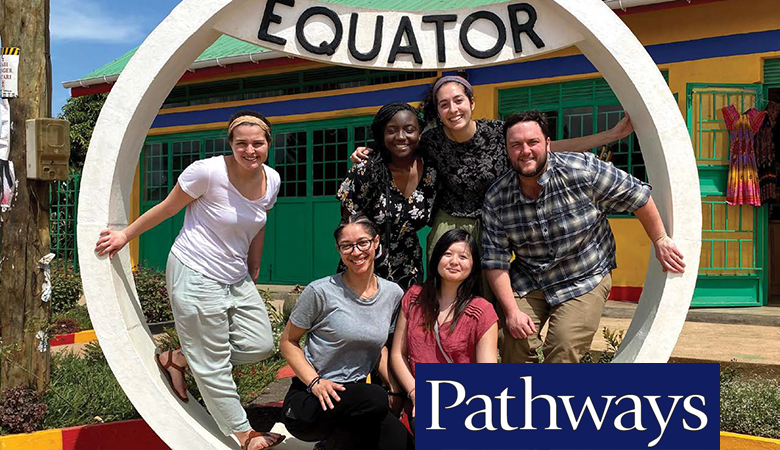Pathways: Innovation in Rural Global Medicine Elective Takes Students to Uganda

In February, eight UICOMP third year students completed a two-week rural global rotation as part of the Innovation in Rural Global Medicine (IRGmed) program. Six traveled to the African country of Uganda and were based at Mbarara University of Science and Technology while two others were based at OSF Center for Health in Streator in north central Illinois.
IRGmed is a four-year elective that teaches the tools and techniques of innovation that are required to create sustainable change, improve access to health care, and reduce health disparities in under-served rural communities. Rural communities around the globe are faced with limited resources, and these austere environments create unique health challenges, not only in administering health care but also in mitigating the disparities that exist for rural communities.
Prior to the rotation, students were assigned problem statements provided by community stakeholders specific to their placement site. Once they arrived, under the guidance and mentorship of local innovation lab faculty, students worked in pairs to present research summaries, learn from local subject matter experts, identify gaps in care delivery and observe existing processes. At the conclusion of their rotation, they developed and presented prototype solutions to a panel of experts.
The problem statements included such topics as improving access to prenatal care; early screening and diagnosis of depression; empowerment and education of “patient attendants” (like a family caregiver); food insecurity and utilization of a mobile clinic to reach vulnerable populations.“In a clinically austere environment, clinicians may not have an MRI or access to a subspecialist,” explains Sarah Stewart de Ramirez, MD, co-director of the IRGmed program.
“When we started looking at problem statements surfacing from global communities in rural areas, we realized they were in alignment with the issues facing our rural communities here.”
“If we can prepare students to practice in clinically austere environments, regardless of location, they will have the tools and skills to make meaningful changes and approach these unique challenges in new ways,” she says.
“It requires an understanding of population health, and the realization that the problems are not unique to any one geographical area. We want to teach students how to innovate and how to be humble enough to learn from rural populations. This is not only about creating sustainable solutions, but this is about how we change clinician education to inspire students to be catalysts for changing healthcare,” says Stewart de Ramirez.
The IRGmed program accepts 8 - 12 first year UICOMP students each year through a competitive application process. During the first two years of the elective, students experience healthcare delivery and public health from expert practitioners and spend focused time in rural primary care clinics. In the third year, students complete an intensive two-week course that includes a variety of classroom and simulation sessions to provide them with an understanding of clinical care practice in austere settings, cultural humility, and the innovation design process. Students then complete the two-week immersive rotation in either a rural U.S. or rural global environment where they work with stake-holders to develop innovative solutions to address local health challenges. Some prototypes will then be further developed in partnership with the OSF Innovation Labs. Fourth year students complete a capstone project, including a paper, poster and presentation.
Stewart de Ramirez commended the leadership and collaboration opportunity provided by Dr. Data Santorino of Mbarara University of Science and Technology (MUST). Not only did Dr. Data meet with UICOMP students in Peoria months before their travel to Uganda, but he and his team of experts generously gave of their time to mentoring and guiding the IRGmed students throughout the innovation process. “Mbarara was a key partner and essential to the success of this rotation. MUST is known for medicine as well as innovation,” says Stewart de Ramirez. “This is really a partnership around innovation. The huge thrust is that patients in austere settings face the same challenges and obstacles. We can learn and innovate with each other regardless of geographic location.”
This article is part of the Fall 2020 edition of Pathways. Read the full issue.